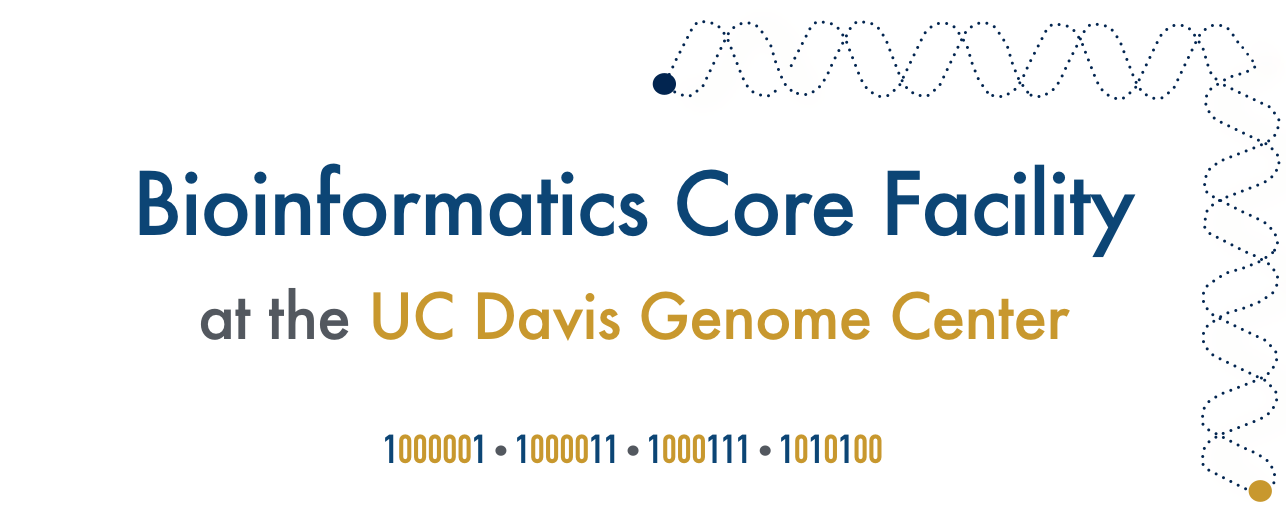2018 Biennial Genome Assembly Workshop [ kmer, 10X Genomics, Pac Bio, Oxford Nanopore and Hi-C ]
Dec. 17, 2018, 9 a.m. - Dec. 20, 2018, 5 p.m.
Organizer -
Bioinformatics Core
Contact -
UC Davis Bioinformatics Core, training.bioinformatics@ucdavis.edu
Location -
UC Davis Campus
Genome Assembly is currently in a renaissance, with new technologies coming together to complement each other, producing high-quality reference grade assemblies. Technologies such as linked reads (10x genomics and Illumina), long read technologies (Pacific Biosciences and Oxford Nanopore Technologies), Hi-C (Dovetail Genomics and Phase Genomics), high-throughput image mapping (Bionano Genomics), along with corresponding algorithms and methodologies are coming together to produce 'high' quality genome assemblies. This workshop will focus on project design, library and sequencing technologies, genome assembly and data type integration process, and evaluation in a practical and informative setting. Two guest lecturers will be present for this workshop Gonzalo Garcia Accinelli, Earlham Institute, UK and Zev Kronenberg, Phase Genomics, US to discuss kmers and Hi-C respectively.
The format will be approximately half lecture and half hands-on. The hands-on portion of the workshop will involve command-line interaction with some R, therefore prior command-line experience is a must to fully participate. If you are not familiar with the command line but would like to attend, listen, and learn that is OK, but we will be unable to train you in how to use the command-line during this workshop.
Topics will include:
- Technology overview and how they integrate together to produce better genomes
- Project design and sample considerations
- Estimating sequencing needs associated costs
- QA/QC of raw data
- kmer analysis using KAT (special guest lecturer Gonzalo Garcia Accinelli, Earlham Institute, UK)
- Genome Assembly using Falcon and Canu for Pacific Biosciences and Oxford Nanopore
- Supernova for 10X genomics linked read technology
- Incorportation of Hi-C data (special guest lecturer Zev Kronenberg, Phase Genomics, US)
- Genome statistics and evaluating assemblies
- Discussion on haplotyping genome (falcon-unzip and falcon-phase)
Who should attend? … Anyone who is considering doing a eukaryotic genome assembly project. Bacterial genome assemblies, or metagenomics, are discussed in other workshops. Prior workshop participants have included faculty, post docs, grad students, staff, and industry researchers.
What are the prerequisites? … The hands on portion of the workshop will be on the command-line and in R and RStudio. If you are not familiar with the command line you can still attend, listen and learn. But we will not have time to train participants on how to use the command-line or R during the workshop.
What do I need to bring? … You will need to bring your own laptop to use, it will need to be able to run Chrome or Firefox, have a recent version of Java installed, and an application that will allow you to ssh into a server (e.g. Putty, or iTerm). Assembly computation will be done on the UCD Bioinformatics Core Cluster. We can help with setup early on in the workshop. If your department does not allow you to install software on the laptop you’ll be bringing, please contact us ahead of time.
Can I bring my own data? … No, but we will provide experimental datasets for use during the workshop, as this helps to keep the workshop moving. There will be time, however, to discuss your own datasets and how you might work with them outside of the workshop.
How much does it cost? … The registration fee is $1,000 for any UC students, staff, and faculty, $1,200 for other academic or non-profit participants and $2,500 for commercial and for-profit participants. We accept credit cards, as well as UC Davis recharge accounts, for payment. Registration fees include light breakfast, lunch, and snacks, but do not include dinner, lodging or parking fees.
Where is the workshop? … It will be held on the UC Davis campus and will run from 9:00am to 5:00pm on the dates indicated, the specific location will be provided a few days before the workshop.
How do I apply? … All registration is “first-come, first-served”. There is no application process. So, sign up as soon as possible to ensure your place in the workshop.
Where can I find more information, including your policies? ... Go to our website (bioinformatics.ucdavis.edu/training/) and check out our FAQ and Policies.
Questions?
If you have any questions, please don’t hesitate to contact us at training.bioinformatics@ucdavis.edu
